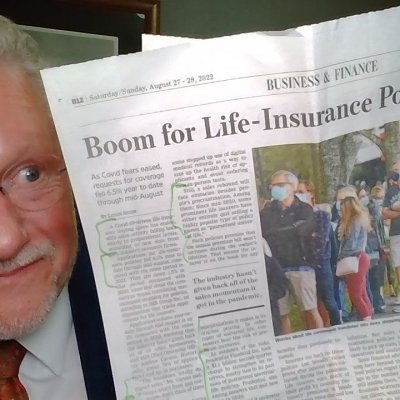What do I do when I don’t have time for anything else? Well, I make certain that I make the time for things, but one of the things I do each and every day is that I look at The Wall Street Journal. I was looking at the Saturday/Sunday addition, which would be August 27th and 28th, in section B, page 12, titled “Boom for Life Insurance Policies Fades”. What does this mean? Well, do you remember Covid-19? It’s still out and about, but many people think that the vast majority of problems have passed us by. Maybe. Maybe not. But it seems that people are less likely to buy life insurance now than they would have been a year or two years ago because of the fear of the Covid-19 pandemic.
The Covid fears have eased according to this business finance article, and the requests for life insurance coverage has now fallen 6.5% so far this year. The Covid-19 driven life insurance buying spree, according to this article, has ended and sales have gone back near to pre-pandemic levels, according to new data. Applications for life insurance fell that 6.5% to date and that is down 1.5% compared to the year 2020 when fear of the coronavirus began translating into increased shopping for policies.
Isn’t that interesting? When people thought they might die, they then realized that they should maybe think about getting some life insurance. Here’s what’s interesting: the chance of death now that the fears of COVID-19 are decreasing is still 100%! You and I are not getting out alive. That’s what makes me laugh because people are fearful if they think death is going to happen immediately, but the deal is: it’s going to happen to all of us.
So, it says here that the “headlines” totally do impact sales: if things aren’t front and center, people don’t think of them immediately. What is also interesting about this article is that sales have still rebounded to face obstacles because of people’s procrastination. It says that some types of policies, it refers to a guaranteed universal life, are basically not an option for people. Such policies say that the annual premium bill won’t increase during the owner’s life. That means that the insurer is on the hook for any kind of miscalculations that they might have made. This is one of the reasons that I’m not crazy about universal life because there are internal problems with the design of this product that has been around since the mid-1970s. It goes on to say that as evidence for the risks, Prudential Financial actually took a $1.1 Billion second quarter charge just to strengthen their reserves. Prudential and a lot of other insurers are quitting new sales in that category/product.
What is interesting about guaranteed universal life is that it’s actually really not a guaranteed product. Though I guess you could say that it is, if you follow the letter of the law or the letter of the contract anyways. I am a contract reader, which is getting into the words that most people never, ever get into the contract. This shows you how boring my life is because I love to read contracts. If you miss one premium payment ever, the guarantee is gone. If you borrow money against a guaranteed universal life policy, the guarantee is gone. There are all these stipulations that even if you wrote your check out in time, if it doesn’t get to them in time or if it’s not processed in time, the guarantee is gone. If for some reason it is on an automatic payment schedule and your bank makes a mistake or by chance someone at the home office makes a mistake, it could cause the guaranteed part of a guaranteed universal life policy to become just a regular universal life policy. I have seen time and time again with interest rates and how those have been affected over the years and how something that you believe is “tried and true” …well it has been tried, but it’s no longer true. You could then be without life insurance coverage that you had been paying month after month, year after year, and all of a sudden, the guarantees are gone.
That is why at the end of the day I want something that is iron clad. I want something that is going to last, no matter what, based on the guarantees. Yes, I realize that there is a 100% chance that I am going to depart from this world and on that day, I want my family to be able to walk my death certificate over to the insurance company and within 10 days I want tax-fee money to be deposited into every single bank account of every single person that I love, of every single person that I have said that I want to have part of the action when I’m gone. Then they can live their life fully and do it all over again. Oh, by the way, I’m not planning on leaving for a long, long time.
So, if that is the case and I know that my end game is going to have this leverage tool of a permanent whole life insurance policy that has been issued through a mutually held insurance company that has participatory policies, which means that I participate in profitability of the company, I want to be able to use those policies to be able to store my safe cash. I want to have a place where I can call upon it and use that money while I’m still alive and without it being detrimental to my policy. So, I can actually use that money that is stashed inside of my policy without giving up my guarantees. The guarantees stay there because it’s based on the longevity of my whole life, which means that they last for as long as I live or until age 121, whichever comes first. Now I have a goal: to outlive my life insurance. If I can do that, that means that I’ve utilized the cash, utilized the equity inside of my life insurance policy let’s say for many, many decades to come. The money is not trapped. It is free to do remarkable, awesome things for me. But at the end of the day, it’s going to be the end of the day (my death). At that point in time, I want to replace my entire estate so those people that I love can do it all over again. Because of the way that the tax code is setup with the IRS, they will be able to do that income-tax free.
When I look at an article saying that the boom for life insurance policies have faded, well those policies have faded because those people are only thinking about a death benefit because they were only thinking about the coronavirus and ‘oh my gosh I might die sometime soon’. Instead, I am living large. I want to die way, way out in the future. Now, in the event that something happens along the way (where I die sooner), I will probably be the first to know, and I’ll be okay, but the goal is to live as long as possible and to be able to utilize the resources that I have built up: safe, sound, and secure inside that life insurance contract. My policy is a contract and it has guarantees and it has reserves in place to make sure that it is iron clad with the guarantees.
So, plan for today, but live as if you will live for 121 years of age. To find out more about the thinking behind this, I invite you to get my book Investments Don’t Hug: Embracing the Life Insurance Asset, which is available online through Amazon or Barnes and Noble, or listen at Audible or iTunes. If you are ready to rock and roll and make this life insurance asset one of your most powerful assets, contact me and my team. It’s easy to find us at www.investmentsdonthug.com.



